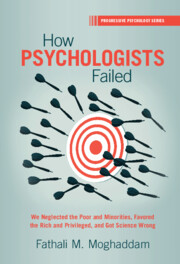Refine search
Actions for selected content:
2 results
Chapter 1 - Why We Must Rethink Psychology
-
- Book:
- How Psychologists Failed
- Published online:
- 27 October 2022
- Print publication:
- 03 November 2022, pp 1-12
-
- Chapter
- Export citation

How Psychologists Failed
- We Neglected the Poor and Minorities, Favored the Rich and Privileged, and Got Science Wrong
-
- Published online:
- 27 October 2022
- Print publication:
- 03 November 2022
